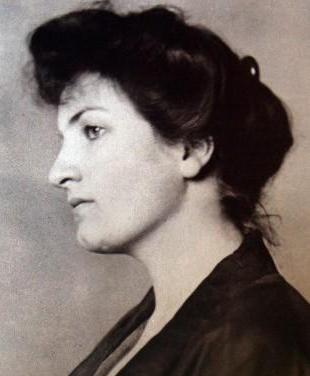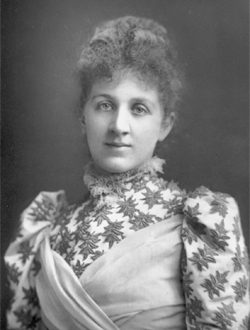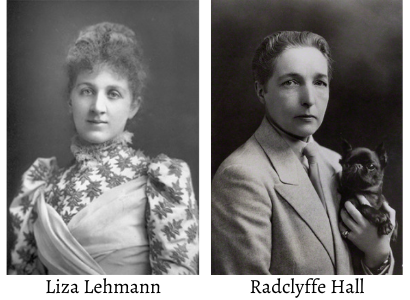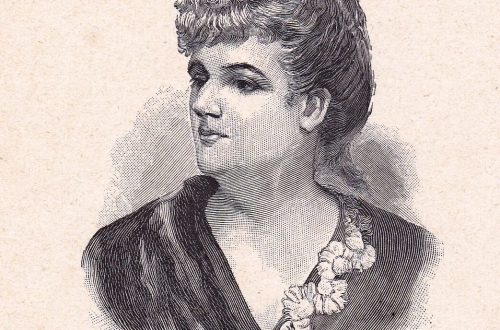Alma Mahler-Werfel has always been a bit of a legend, certainly in her capacity as muse and wife (or lover) to an impressive assortment of cultural luminaries. Her elevated status is hardly surprising, considering that her husbands included composer Gustav Mahler, the Bauhaus founder Walter Gropius, and the writer Franz Werfel, not to mention the other flings, of varying seriousness, with composer Alexander von Zemlinsky and the painters Gustav Klimt and Oskar Kokoschka.
A good part of her mystique, of course, tends to revolve around the question of how she managed to exert such a pull over all these men, all brilliant but each so different in his own way. As Tom Lehrer famously marveled in his song “Alma”, written shortly after her death:
Though you didn’t even use Ponds,
You got Gustav and Walter and Franz.
And yet she was very far from being perfect – quite the contrary, as it happens! She was extremely self-absorbed to begin with, but, more unforgivably, her anti-Semitic remarks – about Mahler, Zemlinsky, Werfel and others – as recorded in her diaries (or, in some cases, by her contemporaries) have not lost their ability to shock with their casual cruelty. But, as Sarah Connolly argues in her essay entitled “The Alma Problem”, if she was a monster, she was nevertheless a “very intriguing monster”. (Much along the same lines, Marietta Torberg, a friend, or perhaps more precisely a frenemy, famously commented that Alma was “a great lady – and also a cesspit.”)
And certainly the men who fell for her, one after the other, did find her extremely intriguing, which was perhaps not entirely surprising. She was known for her beauty in her youth, was very well-read and accomplished (well beyond what would be expected of the typical well-brought-up young lady), and also seems to have been quite unashamed of her sexuality. All of this together in one woman must have been like catnip to men in a world where the Madonna/whore paradigm loomed large and where, as a result, women of her social class were expected to “behave” themselves and to avoid scandal.
Despite her adventurous love life, however, Alma proved to be not entirely unconventional in her decision to become a muse to great men, rather than having a career of her own as a composer (though, admittedly, that would have been much more challenging, given the times she lived in). And so it is that, despite a relatively small, if well-crafted portfolio of compositions, we know her less for the art she created and more for the art she inspired: Mahler’s Fifth and Tenth Symphonies (book-ending their marriage), Zemlinsky’s Der Zwerg and possibly the Lyric Symphony* (both written after their breakup), many paintings by Kokoschka (most famously The Bride of the Wind).
Nevertheless, that portfolio has survived, in no small part thanks to Mahler, who helped to get some of Alma’s music published, in an attempt to repair their marriage after discovering her affair with Gropius. It is an interesting collection, quite sophisticated in its own right, more than just a curious artifact left to us by the muse who inspired so many – and certainly enough to make one wonder what she could have come up with had she turned her not inconsiderable energies to composing instead.
*There is some uncertainty as to whether the Lyric Symphony was inspired by Zemlinsky’s former relationship with Alma or his relationship with Luise Sachsel, the woman who would become his second wife. Somewhat piquantly, though, what we do know for sure is that Alma would play a role (albeit a supporting one) in the creation of another work related to it. Alban Berg was involved at the time in a passionate affair with one Hanna Fuchs-Robettin, and his Lyric Suite is full of encoded references to their relationship, one of which is a quotation of the line “Du bist mein Eigen” (“You are my own”) from the Zemlinsky work. Which in itself might not seem to have much to do with Alma, except that Hanna Fuchs-Robettin was also Alma’s sister-in-law through her final marriage to Franz Werfel. Berg and Fuchs-Robettin’s illicit correspondence was assisted by Alma and the philosopher Theodor Adorno (quite the pair of couriers!), who helped them carry letters to each other – a magnificent illustration of how extraordinarily entangled the artistic circles of Vienna were at the time.
Can’t get enough?
Visit our Bibliography page for further sources.
Subscribe to our Newsletter!



